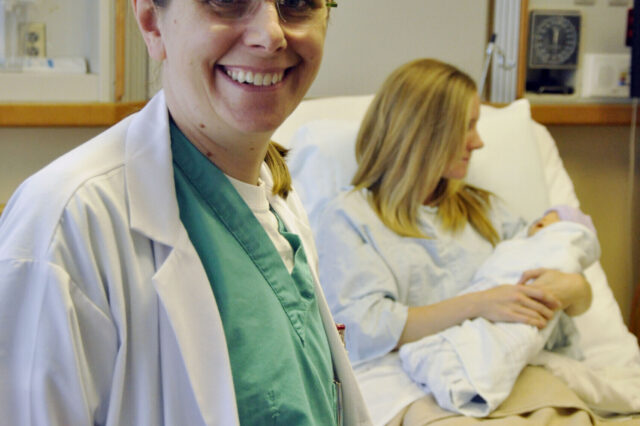Helping mothers and babies

Jane Houston, D.N.P., C.N.M., delivered her first baby in 1990 as a midwife student in her native Scotland. More than 2,000 deliveries later, Houston, a nurse-midwife, still strives to give expectant mothers the best birth experience possible.
“Your birth experience will be with you for your whole life,” said Houston, track coordinator for midwifery at the UF College of Nursing. “The way you give birth affects the way you bond with your child.”
Houston has more than 20 years of experience. After earning her midwife qualification in Scotland, Houston joined her sister, an obstetrician, at a mission hospital in Zimbabwe. Drought prevented the hospital from having more than an hour of water each day. Patients suffered from tuberculosis and malaria. Forty percent had HIV.
For four months, Houston worked in the labor and delivery unit, a single room with three beds. There were no drugs for pain, only general anesthesia if a woman needed a cesarean section. Houston remembers a day when the beds were occupied by women who already had nine or more children. Pregnant again, they went into labor at the same time.
“My time in Zimbabwe showed me not to be frightened of birth,” Houston said. “If there is a problem, you have to deal with it.”
After Zimbabwe, Houston worked as a midwife in New Zealand for three years before earning a nurse-midwifery degree from the UF College of Nursing-Jacksonville. She became the first midwife at North Florida Regional Medical Center, where she worked for eight years.
Houston developed deep bonds with expectant families. She knew their dogs’ names and could tell their voices on the telephone. Sometimes she delivered all the children in a family.
Houston now practices at Shands Jacksonville. On Wednesdays, she works in triage and labor and delivery, helping bring babies into the world.
About 12 percent of babies born in Florida are delivered by midwives, Houston said. It is a tight-knit profession. Houston knows all the midwives in the area. They call themselves “baby catchers.” Mothers deliver babies, Houston said. Midwives just catch them.
“It’s one of the most life-changing events, and I get to be a part of it,” she said. “It’s the best high, you can’t even imagine. I don’t have to take drugs — I get to catch babies.”